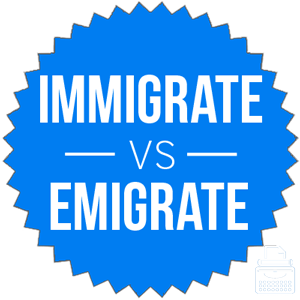“Immigrate” and “emigrate” are two words that have similar meanings and can be easily confused. The differences between the two are subtle but important, especially if you want to keep your writing from looking sloppy. So, in this post we’ll go over the differences between the two terms, how to use them, and show you a trick to remember their differences.
When To Use Migrate
Before we get into the difference between “immigrate” and “emigrate,” we should look at the word “migrate.” To migrate is to move from one country or region and settle in another. Migrate is an umbrella term under which both “immigrate” and “emigrate” fall. When it applies to people, it generally means a permanent move but can also mean a temporary relocation. For example,
- Many Easterners migrated west during the California Gold Rush (permanent move).
- Many workers migrate north for cropping season (temporary relocation).
When “migrate” applies to animals such as birds, it generally means a seasonal or temporary change in habitat. For example,
- Robins migrate south every winter.
When To Use Immigrate
 To immigrate is to enter and settle in a foreign country, leaving a past home. “Immigrate” implies a permanent move and applies only to people. For example,
To immigrate is to enter and settle in a foreign country, leaving a past home. “Immigrate” implies a permanent move and applies only to people. For example,
- My grandparents immigrated to the United States in the 1920s.
There is one main feature that distinguishes “immigrate” from “migrate.” “Immigrate” means an individual or group of people have moved into a new, foreign country. “Migrate” does not require moving into foreign land; it just implies moving. “Immigrate” usually refers to the crossing of a political boundary (moving into a new country) where “migrate” can just be moving to a new region. For instance,
- Many Michiganders migrate south for the winter.
In this example, Michiganders aren’t moving to a foreign land, but they are migrating south for the winter.
When To Use Emigrate
 To emigrate is to leave one country or region to settle in another. “Emigrate” implies a permanent move and only applies to people. For example,
To emigrate is to leave one country or region to settle in another. “Emigrate” implies a permanent move and only applies to people. For example,
- My grandparents emigrated from Norway.
The difference between “immigrate” and “emigrate” is that “immigrating” is the act of entering a foreign country to live while “emigrating” is the act of leaving a country to live in another. Consider the differences in our above examples,
- My grandparents immigrated to the United States.
- My grandparents emigrated from Norway.
In this example, my grandparents are immigrants here in the United States, but back in Norway, they are emigrants. The graphic below does a good job illustrating the difference.
Trick to Remember the Difference
 There is a good trick to remember the differences between “immigrate” and “emigrate.” The prefix e- (or ex-) usually means “out of” or “from.” The prefix im- (or in-) often means “in” or “into.”
There is a good trick to remember the differences between “immigrate” and “emigrate.” The prefix e- (or ex-) usually means “out of” or “from.” The prefix im- (or in-) often means “in” or “into.”
Therefore, emigrate means “to move out of” and immigrate means “to move into.”
Or to put it even more simply,
- You immigrate “into” places.
- You emigrate “from” places.
Summary
To summarize,
- Migration is an umbrella term that covers both “immigrate” and “emigrate.”
- “Immigrate” is to enter a foreign country to live.
- “Emigrate” is to leave a country in order to live in another.
Contents
